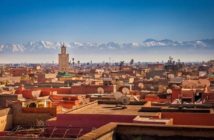In Vancouver, most authors head to Barbara-jo’s Books To Cooks to share food with fans, sign books and talk about their food. I caught up with some of these authors and these are snippets of my conversations with them.
MOURAD LAHLOU
His cookbook Mourad: New Moroccan (Artisan, $46) is so imbued with his passion and so redolent with the flavours of Morocco, I wanted to drop everything and board a flight. Mourad is as cerebral as he is sensuous and emotional about his food.
If things had gone according to original plans, he would have his PhD in economics, working as a suit at the World Bank or International Monetary Fund. But cooking for himself as a student in the ’80s thwarted those plans. Homesick for the ritual of daily lunches with his extended family in which everyone had a hand, he learned to cook the dishes from memory. Somehow, that eventually morphed into opening a one-Michelin star Moroccan restaurant called Aziza in 2001.
“It was drastic for me,” he says of the culinary shock when he moved to San Francisco in 1985. “I felt like I was eating food stripped of any kind of soul. So many days, I’d be so sad and heartbroken,” he says.
That midday meal was the emotional heart of the family; they planned it in the morning, shopped at the markets, then the women cooked and no one ate until everyone had gathered.
“The Occupy Wall Street people talk about the 99 per cent. In Morocco, it’s 99.9 per cent. I thought if I came to the West, with the biggest middle class in the world, I’d figure it out and do something.”
What he learned was how much his life in Marrakech meant. “We didn’t have much,” he said. “We were a large family and our happiest times were spent around the table. We didn’t have much to show off and cooking was the only vehicle to express hospitality and generosity.”
In North America, he found Moroccan food was a cliché and hadn’t changed for decades. “I didn’t want to change the traditional foods, but I felt it wasn’t honest to hold fast to traditions here. You can’t. Cumin isn’t the same as it is in Morocco. Chicken tastes different. In Marrakech, I got the best Moroccan food because it includes the smells, the sounds, the visuals of the city,” he said in Vancouver last week.
“I have vivid memories of opening spice bags back home. Here, it doesn’t smell like anything. It’s probably two years old by the time you get it. The oils are gone. There’s nothing left but dust.”
Tagines, in Morocco, are not glazed (as they are, by law, in North America). “In Morocco, those unglazed tagines capture flavours down through the generations. If you pour water in it, put it over hot coals, within a few minutes, the water will be flavoured,” he says.
As a chef, he’s open to new ideas and tweaking the traditional dishes. But the couscous, he says, is made by hand, by a cook who’s done it for 16 years.






